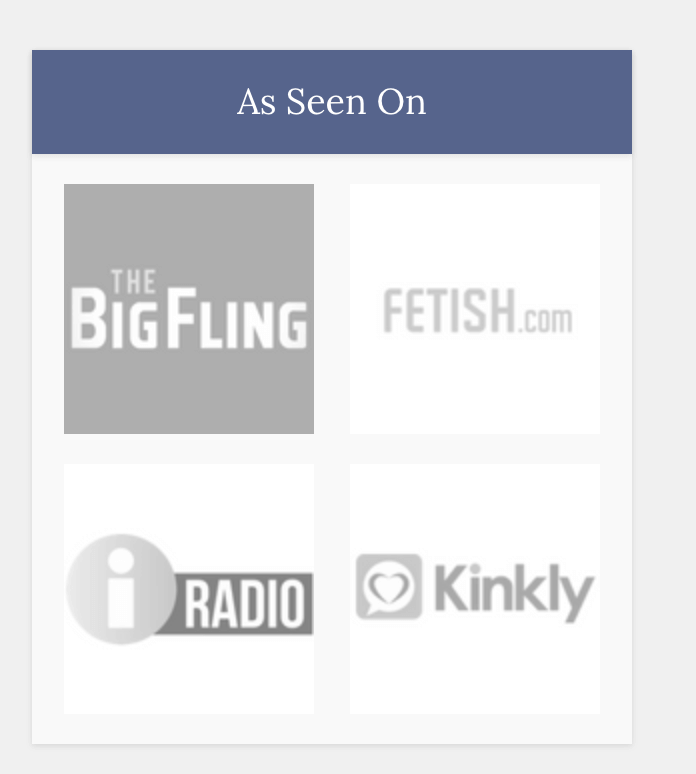Why Your Smutlancer Site Needs E-A-T | Smutlancer SEO Series
While we never endorse letting the Google algorithms determine what you publish or how you design your website, the reality is that a few tweaks in one direction or another can have a major impact on whether you get any traffic from search. An SEO concept known as E-A-T has been widely discussed in SEO circles since about 2018 when a major Google update brought down the traffic to major (non-smutty) sites around the internet. Why? Because they didn’t meet the standards of E-A-T.
Since then, most SEO experts agree that it’s not enough to use the right keywords or to publish consistently. Your site needs to have E-A-T to have a chance to rank. So let’s dive into what it is and how it can impact your smutlancing website.
What is E-A-T?
 E-A-T stands for expertise, authority, and trust — three things Google looks for to determine if your article or site should be delivered up as a search result. To be clear, there is no specific score assigned to a site’s E-A-T. There’s no ranking factor or number. And, as with all things SEO, there’s no single specific thing you can do to have a “perfect” E-A-T. Instead, your site’s E-A-T is about a range of different factors that can all add up to show your expertise, authority, and trustworthiness.
E-A-T stands for expertise, authority, and trust — three things Google looks for to determine if your article or site should be delivered up as a search result. To be clear, there is no specific score assigned to a site’s E-A-T. There’s no ranking factor or number. And, as with all things SEO, there’s no single specific thing you can do to have a “perfect” E-A-T. Instead, your site’s E-A-T is about a range of different factors that can all add up to show your expertise, authority, and trustworthiness.
Expertise
Expertise indicates the depth of your knowledge on the topic of your website. In some cases, this expertise is about your educational background or professional knowledge. In other cases, it’s about your “everyday expertise.” A certified sex coach would have an educational background or professional knowledge level of expertise. A blogger sharing their life as a queer kinkster would fall under the “everyday expertise” category.
Authority
To have authority in your chosen niche or topic means having the knowledge and skill level to credibly publish content on that topic. This directly correlates with your expertise. Where does your knowledge come from — lived experience, a certification program, somewhere else? There’s no right answer, but if you discuss topics related to life and health (sex, gender, and kink are generally related to both) and your content is informational on some level, it’s important to be perceived as having some level of “authority” on the topic.
Trust
To be trustworthy is hard to measure. In ye olden days of Google algorithms, this was primarily measured in backlinks. The more sites that linked to your content, the more Google saw you as a potentially reliable source. (If you ever wondered why you get all those spammy requests from random companies to include a link, this is why.) And yes, backlinks continue to be important but it’s not the only way to indicate trustworthiness. Especially as Google is definitely aware people buy backlinks. Essentially, the trust metric wants to know if you’re credible. For smutlancers that sell a product or service through your site, reviews are a great way to indicate trustworthiness.
Understanding YMYL
There’s one more acronym that’s important to understand with E-A-T, even though it may not have a big impact on every smutlancer’s site and that’s YMYL — Your Money, Your Life. This is a way Google classifies certain types of sites and for whom E-A-T is most important. Your Money, Your Life means these sites either sell products or share content that’s important to someone’s life — medical information, technical information, legal information, financial information, newsworthy information, etc. Some smutlancers’ sites could fall into this category if you routinely share educational information about sexual health.
Sites that Google classifies under YMYL get dinged harder when their site’s E-A-T isn’t clear (or well done). Sites that do it well get raised up in search. It’s not necessarily important for many smutlancers to worry about, but it’s something to consider if you move into a health or educational space with your content.
How To Improve Your E-A-T
 Before you panic, it’s important to know that improving your E-A-T is both easier than you realize and not an exact science. Consider it more of an art with suggested best practices. Ultimately what determines your E-A-T is how your audience responds to your content as well as a few signals you can create that Google looks for.
Before you panic, it’s important to know that improving your E-A-T is both easier than you realize and not an exact science. Consider it more of an art with suggested best practices. Ultimately what determines your E-A-T is how your audience responds to your content as well as a few signals you can create that Google looks for.
Here are a few things you can do on your site to improve your E-A-T.
About Page
Write an about page and update it regularly. It should indicate who you are and why you’re writing about this topic. If you’re an author, an educator, or someone with “credentials,” share how long you’ve been doing it, where you got your education, and other relevant details. If you’re not an educator or certified, there’s still plenty of information to share on an about page that can help your E-A-T. Don’t be shy about sharing why you’re the person to share the content found within your site. For example, if your site is about being a queer kinkster, then make it clear that you’re a queer kinkster. Add (to the extent you’re comfortable) how you discovered your identity and why you write the content you do.
As Seen On
Promote other sites where you’ve been featured, quoted, or published. If you get quoted by Cosmopolitan or you’re published on another site, create an “As seen on” section of your site. This can be a separate page, on your about page, on your home page, in a sidebar, or wherever it makes sense. Name the sites, use their logos, and/or link to where you’re quoted. This adds to your authority and expertise. Sort of a “See? I know what I’m talking about because these bigger sites quoted/published me.” Don’t be afraid to self-promote on your site. If you can’t self-promote here, where can you??
This is what it looks like on my personal site (as a sidebar):

How do you get the opportunity to even need an “As seen on” section? Pitch your article ideas to other sites and/or pitch quotes through HARO or #journorequests on Twitter. If you’re quoted or published under the same name as the one you use on your site, you can promote that you’ve been “on” another site.
Audit Informational Content
If you publish informational content — tips based on your personal experience, pure educational advice or resources, etc — it’s important to be aware of how you present that content. It needs to indicate your expertise and/or authority and be trustworthy. Audit and edit your previous content and keep the following tips in mind with new content:
- Link to resources when you use stats or quote other experts.
- Make sure those linked sites are also credible.
- Unless you plan to define “medical” or “technical” terms yourself (and have the expertise to back that up), link to credible resources so someone can learn more. For example, you’re writing about your experience with vaginismus and can give a basic definition of what it is. It’s a good idea to also include a link in your post to a credible health resource that defines vaginismus in medical terms, too.
- Edit older content to update stats or tips as they change including linking to better sites. This is also a good reason to use a plugin like Broken Link Checker to make sure you never have a dead link going nowhere. That’s not helpful if your credible resource no longer has a working link on your site.
- Be critical of your own informational content. Does this need to be said or are you mimicking the same stale content that’s already been published a million times? Yes, you can write on the same topics others write about (please do!), but it needs to have your unique angle or spin. Take this post as an example. E-A-T has been written about a LOT in non-smut spaces but it’s very rare to see it discussed specifically for sex bloggers, sex educators, and other smutlancers.
This gets tricky for smutlancers who focus on fiction or personal experiences. You’re not always writing “informational content”. Other smutlancers might be writing about their personal lives but offering tips that others can follow. So just remember, if you mention a fact, statistic, or quote from a real person, link to where you found that information, regardless of the topic of your post.
Awards
Won a blogger award? Made it on a blogging list? Put that on your website! The homepage is ideal, but your about page will work too. Stop being afraid to tell the world that other people think you’re great! Not only do you deserve the recognition, but it could help show your expertise and authority.
Backlinks
Backlinks are tricky because most attempts to get them come across as spammy. Asking for a backlink can feel spammy. In a perfect world, you create content so good that others can’t help but link to it. But the internet is crowded with content, so this is harder than it used to be. One organic way to get backlinks is through blogger round-ups. Share Our Shit Saturday (a popular round-up back in 2019) was a great way to give/earn backlinks. (Created for community and cross-promotion, backlinks were a great side-benefit of the project.) Bloggers shared what they’d been loving during the week (or month) and linked to other people’s content.
Being on blogger lists and awards (even if you don’t rank high) also gives you a backlink. I know people have Strong Feelings™ about blogger lists but in some cases, they can be helpful for SEO and visibility, so it’s something to consider. Especially if you’ve been on the fence about whether to get your name on a list or not.
Reviews
If you sell a product — books, courses, tickets to seminars, whatever — you need reviews on your site or connected to your name. A lot of large(ish) companies like to use TrustPilot but reviews on your own site help, too. Don’t be afraid to ask for reviews, in your newsletter or in a follow-up email after the sale. Not only does this create user-generated content on your site (another SEO metric), but it creates clear proof of your E-A-T for your product.
If you love a product or service, especially from a small smutlancer business, leave a review whenever possible. Reviews lead to more sales and help increase SEO for that creator/product you love.
Why E-A-T Matters
Even if your site isn’t informational and it’s pure smut, if you want to be found in search and grow your audience, you still need E-A-T. Ultimately, what Google wants is to match people with good content that matches their search intent. When you make your site E-A-T-friendly, you make a better site. You give a new audience member a reason to take a chance on your content. You also big yourself up for a stranger to get to know you. Plus you signal to potential clients or sponsors that you are legit. (You were always legit but these signals help.)
That all of this may also help you rank in search as well only helps further your smutlancer goals.
One thing to remember about E-A-T and all SEO tips and “tricks” — none of them guarantee success. Ultimately, your content matters more than anything. Produce good, interesting content on a consistent basis, and you’ve done more for your site than all the SEO “hacks” will ever do.

This was super helpful (I don’t think I’d ever heard of E-A-T before!) but I’m definitely trying to take a deep breath and not panic about how bad I think I am at doing all of this right now. (I’m feeling particularly called out by the ‘link to where you’re getting your definition of vaginismus from!’ comment because I don’t do that – WHY DON’T I DO THAT?!) Crisis about whether or not I’m actually any good at this smutlancing thing aside, this gave me a few ideas of things I could be doing differently. For example, I had NO IDEA that you could say you’re ‘as seen on’ for places where you’ve pitched and had articles accepted – for some reason I thought it was only places where you got quoted as an expert? And aaaah, also feeling hella called out by the idea that I should be producing “good, interesting content on a consistent basis” when I’ve only published something new TWICE in 2021 so far. I know that I’m meant to be on a break because I’m burned out and that’s fine, but I wish I could stop feeling so guilty and unproductive. Internalised ableism for the win!
I’m glad you covered this here it’s such an important part of SEO and without it Google is unlikely to rank your site highly or even at all. Especially considering sex blogs fall under the YMYL niches. I’ve learnt a bit about this topic while away through reading and watching YouTube videos for niche bloggers but this is the first article I’ve come across that’s directly for sex bloggers. Thank you for sharing. It’s another reason I need to start looking out for guest blogging opportunities once my site is all in order, but there’s so many good reasons to do guest blogging. This is a big one though. I’d love to think that one day I might have some awards to display or badges to post on my site. For now that’s a big goal to work towards, slowly. Again, thanks for sharing.